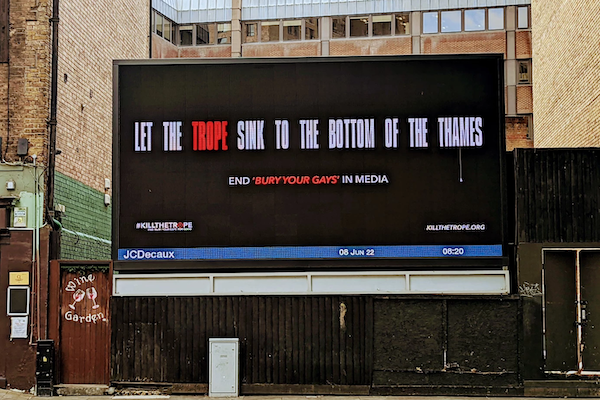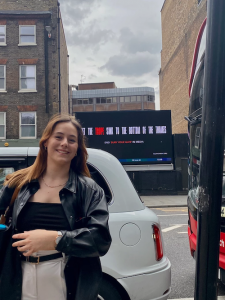Months after the catastrophic Killing Eve series finale, Villanelle’s death continues to spark feelings of betrayal within the show’s international fanbase. Apart from showrunner Laura Neal’s decision to deviate from the source material’s storyline which (spoiler alert) sees Eve and Villianelle settle happily together in Russia, the finale also perpetuated the dangerous “bury your gays” trope. Devastated by a tragic end to an otherwise brilliant story, three fans formed the Killing Eve Billboard Team, vowing ensure that future queer television characters don’t suffer the same fate.
The “bury your gays” trope presents viewers with the needless death of LGBTQ+ characters, sending the message these characters are more expendable than their straight counterparts. “This trope communicates the idea that queer characters are ultimately unable to experience prolonged happiness and that queer storylines have to end before they become fully formed as to avoid telling a proper story about their queerness,” explains Killing Eve Billboard Team member Ines Andersen.
The trope is especially notable in fictional sapphic relationships, shocking viewers who feel represented on screen by exposing them to unexpected violence against the characters they identify with most closely. Andersen remembers first experiencing the trope while watching Buffy the Vampire Slayer. “I was 10 years old when I watched the episode where Tara is shot by a stray bullet. I remember with great clarity how needless and careless her death was, but I didn’t have the words or a proper understanding of my own identity to process it at the time,” Andersen says.
Upon watching the Killing Eve finale, Andersen experienced similar feelings. She went online to connect with other viewers, expecting to find few other unhappy fans. “Instead I found an entire community—primarily consisting of queer women—experiencing inconsolable grief,” Andersen says. In discussing the finale on Reddit, Andersen connected with two other fans—Kate Banks and Avalon Dulac—and the Killing Eve Billboard Team was born.
The team is led by Dulac, who was inspired to take action by the work that LGBT Fans Deserve Better did back in 2016. At the time, CW series The 100 was under fire for using the “bury your gays” trope when writers killed Lexa moments after consummating her relationship with Clarke. LGBT Fans Deserve Better raised significant funds, allowing them to put up billboards in protest all across the United States. “In all honesty, the trope did slow down in the media after that point, and the writers expressed remorse and issued apologies and a commitment never to do it again,” Andersen says.
However six years later, the trope is alive and well in international writers’ rooms. “The goal of the Killing Eve Billboard Team is to communicate to writers in film and television, in no uncertain terms, that this trope needs to end once and for all,” says Andersen. Deciding to focus on the timeliness of Killing Eve’s finale, the team designed billboards that mirrored early promotional billboards for the show. In fact, one billboard—just 400 meters from the River Thames where Villanelle died—reads, “Let the trope sink to the bottom of the Thames. End ‘bury your gays’ in media.”
The team also hopes to reach those who didn’t watch the show. “We wanted the billboards to be general enough that it would pique the interest of anyone wanting to understand what this trope was. We hope that our message will reverberate amongst future writers,” Andersen shares.
Responses to the billboard have been overwhelmingly positive. “We’ve heard a lot of harrowing stories of grief from viewers, most of whom are queer youth who have felt seen and heard by this project,” Andersen says.
The team is currently accepting donations to put up another billboard. If they fail to meet the €6,000 goal, all of the money raised will be donated to The Trevor Project.
Speaking to the connection between the Killing Eve Billboard Team members and other fans who have joined in the fight to end “bury your gays,” Andersen celebrates the fierce community they’ve built. “We all connected with each other right away and supported each other fiercely through our own grief, turning it into action. I think we’re connected for life now,” she says.



